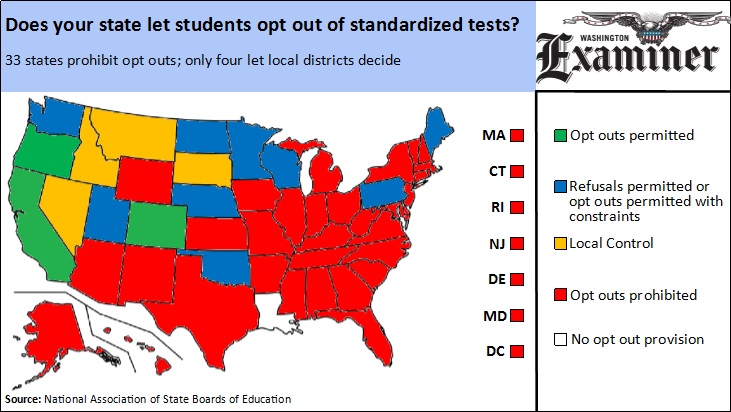As students relax during spring break before entering the final phase of the school year, end-of-the-year standardized tests are coming into focus. Last year, the movement to allow students to opt out of state standardized tests was fierce. Will it be as fierce this year?
Even where parents are adamant about opting their child out of standardized tests, state law may prohibit them from doing so. According to the National Association of State Boards of Education, 33 states require all students to take state tests. “Some states promote counseling parents who refuse to let their students take state tests; others warn that nonparticipation will keep students from fulfilling graduation requirements, violate state attendance policies, or, when the tests in question are exams, may affect student grades,” NASBE’s Sarah-Jane Lorenzo wrote in an opt out policy update in August 2015.
In contrast, only three states allow opt outs for any reason: California, Colorado and Oregon. At the individual level, a student won’t be punished for missing a test. The school, however, might face some federal consequences. “If less than 95 percent of students at a school that receives Title I funds take state tests, the US Department of Education may withhold funding.”

In the remaining states, the opt out situation is a bit murkier. In four states, local school districts decide opt out policies: Idaho, Montana, Nevada and South Dakota. Louisiana doesn’t have any laws or guidance on the books about opt outs.
The nine remaining states all allow students to refuse to take tests or allow opt outs under certain conditions. Five of those states allow opt outs but don’t exempt students from the potential consequences of opting out, like missing a graduation requirement or negative effects on student grades. Pennsylvania allows students to opt out of tests for religious reasons. Other states let students opt out of some state assessments, but not all of them.
If you’re thinking about opting your child out of a state standardized test, it’s important to know the state law and potential consequences. Don’t assume your student can opt out. You may be surprised when it means he or she will fail a course or won’t be allowed to graduate.
Jason Russell is a commentary writer for the Washington Examiner.
